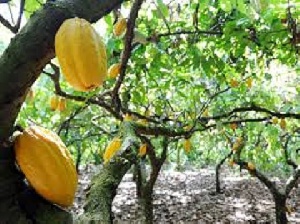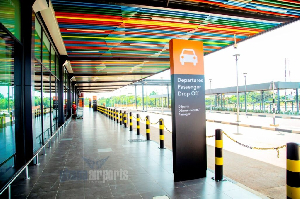Access to cocoa inputs for farmers is expected to scale up with the introduction of the new Cocoa Input Policy soon to be implemented.
The policy would ensure Ghanaian cocoa farmers get requisite rations of cocoa inputs at subsidised prices on the market.
Mr William Agyapong Quaitoo, the Deputy Minister of Food and Agriculture, speaking at the Ghana Cocoa Inputs Workshop on Friday, said the policy where free inputs had benefitted a section of farmers to the neglect of others, had not yielded desired results and was thus unsustainable.
The workshop, hosted by Ghana Cocoa Board with the support of the World Cocoa Foundation and Solidaridad, was to deliberate and suggest ways to enhance the policy for the growth of the cocoa sector and to increase production of the crop to the government’s target of one million tonnes in 2020.
He explained that the current trend could be changed if the inputs were available and accessible to all farmers on the open market at subsidised prices, putting in place a credit system to support farmers secure the full complement of the recommended inputs.
“Let us develop the capacity of the producer to secure credit at a reasonable cost to support his farming business. Input credit at reasonable cost can be possible if the creditor believes the producer has the capacity to use the credit to create wealth.
“The farmers can invest for profitable returns if we help them to acquire the requisite managerial and leadership skills particularly when government has decided on key innovative strategies such as artificial polling trip and solar irrigation,” he said.
He said the NPP government was committed to “reverse the dwindling fortunes of cocoa farming and return to economic levels of productivity, adding they would partner with stakeholders to develop the best workable policy document for inputs delivery and effective organisation of cocoa farmers.
Mr Quaitoo noted that climate change caused by industrialisation and unsustainable agricultural practices had altered the dynamics of the farming seasons.
This, he said, coupled with the effects of pests and diseases had resulted in a consistent decline of considerable volumes of cocoa production.
He said the downward direction of both production and price of cocoa globally had placed the sustainability of the cocoa industry under ‘serious threat’.
Mr Vincent Frimpong Manu, the Country Director of World Cocoa Foundation, embraced government’s new cocoa inputs policy, saying “it would create an enabling environment to improve farmers’ access to inputs in and in right quantities and in a more cost effective way”.
He said as the convener in the private sector value chain, they were committed to working with the Ghana Cocoa Board and other stakeholders to achieve a more sustainable cocoa sector in Ghana.
Mr Manu said they had been in partnership with the government on various projects and programmes including the African Cocoa Initiative.
He added that to address environmental challenges in the cocoa sector, they were implementing a Climate Smart Cocoa Programme in the West African sub-region and providing technical support to COCOBOD to help develop a Climate Smart Cocoa standard for Ghana.
He noted that the WCF had engaged in several efforts including investment in education in cocoa communities to reduce child labour in those areas and respond to land tenure challenges in the cocoa sector.
Mr Manu urged all stakeholders in the cocoa sector to take keen interest in the new policy as its implementation was colossal and government alone could not shoulder.
Mr Ron Strikker, the Ambassador of the Kingdom of the Netherlands to Ghana, lauded government’s commitment to building a strong agricultural sector adding that there was the need to support cocoa farmers to become attractive for private sector investment and to be able to access credit on their own terms.
Mr Emmanuel Opoku, Executive Director Cocoa Health and Extension Division, said there was the need for stakeholders to find a suitable and better way of financing the inputs.
General News of Friday, 7 July 2017
Source: Ghana News Agency

















